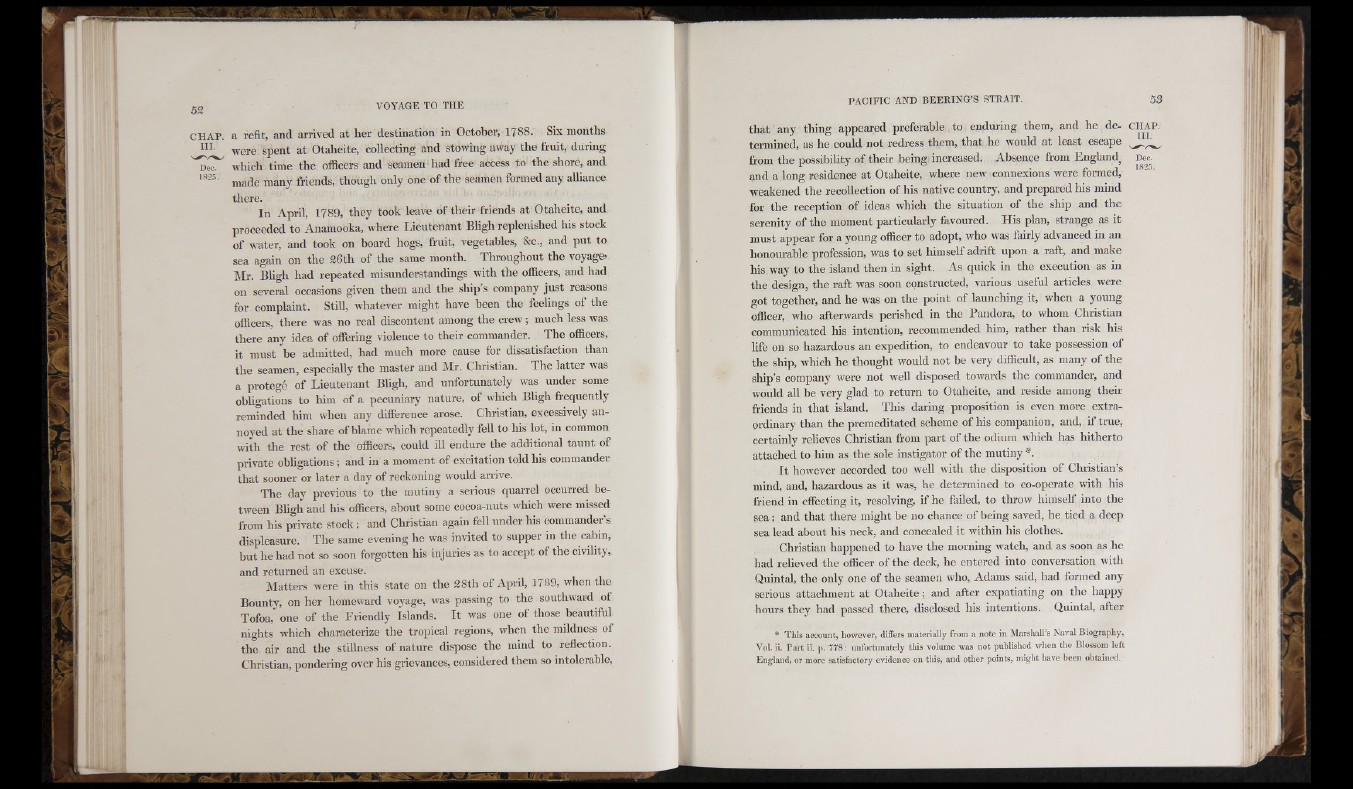
lün
VOYAGE TO THE
a refit, and arrived at her destination in October, 1788. Six months
were spent at Otaheite, collecting and stowing away the fruit, during
which time the officers and seamen had free access to the shore, and
made many friends, though only one of the seamen formed any alliance
there.I
n April, 1789, they took leave of their friends at Otaheite, and
proceeded to Anamooka, where Lieutenant Bligh replenished his stock
of water, and took on board hogs, fruit, vegetables, &c., and put to
sea again on the 26th of the same month. Throughout the voyage.
Mr. Bligh had repeated misunderstandings with the officers, and had
on several occasions given them and the ship’s company just reasons
for complaint. Still, whatever might have been the feelings of the
officers, there was no real discontent among the crew ; much less was
there any idea of offering violence to their commander. The officers,
it must be admitted, had much more cause for dissatisfaction than
the seamen, especially the master and Mr. Christian. The latter was
a protege of Lieutenant Bligh, and unfortunately was under some
obligations to him of a pecuniary nature, of which Bligh frequently
reminded him when any difference arose. Chi-istian, excessively annoyed
at the share of blame which repeatedly fell to his lot, in common
with the rest of the officers, could ill endure the additional taunt of
private obhgations ; and in a moment of excitation told his commander
that sooner or later a day of reckoning would arrive.
The day previous to the mutiny a serious quarrel occurred between
Bligh and his officers, about some cocoa-nuts which were missed
from his private stock ; and Christian again fell under his commander’s
displeasure. The same evening he was invited to supper in the cabin,
but he had not so soon forgotten his injuries as to accept of the civility,
and returned an excuse.
Matters were in this state on the 28th of April, 1789, when the
Bounty, on her homeward voyage, w'as passing to the southward of
Tofoa, one of the Friendly Islands. It was one of those beautiful
nights which characterize the tropical regions, when the mildness of
the air and the stillness of nature dispose the mind to reflection.
Christian, pondering over his grievances, considered them so intolerable,
PACIFIC AND B E E R IN C ’S STRAIT.
that any thing appeared preferable to enduring them, and he de- C H A P
termined, as he could not redress them, that he would at least escape ” 1’
from the possibility of their being increased. Absence from England
Dec.
and a long residence at Otaheite, where new connexions were formed,
182.Î.
weakened the recollection of his native country, and prepared his mind
for the reception of ideas which the situation of the ship and the
serenity of the moment particularly favoured. His plan, strange as it
must appear for a young officer to adopt, who was fairly advanced in an
honourable profession, was to set himself adrift upon a raft, and make
his way to the island then in sight. As quick in the execution as in
the design, the raft was soon constructed, various useful articles were
got together, and he was on the point of launching it, when a young
officer, who afterwards perished in the Pandora, to whom Christian
communicated his intention, recommended him, rather than risk his
life on so hazardous an expedition, to endeavour to take possession of
the ship, which he thought would not be very difficult, as many of the
ship’s company were not well disposed towards the commander, and
would all be very glad to return to Otaheite, and reside among their
friends in that island. This daring proposition is even more extraordinary
than the premeditated scheme of his companion, and, if true,
certainly relieves Christian from part of the odium which has hitherto
attached to him as the sole instigator of the mutiny *.
It however accorded too well with the disposition of Christian’s
mind, and, hazardous as it was, he determined to co-operate with his
friend in effecting it, resolving, if he failed, to throw himself into the
sea ; and that there might be no chance of being saved, he tied a deep
sea lead about his neck, and concealed it within his clothes.
Christian happened to have the morning watch, and as soon as he
had relieved the officer of the deck, he entered into conversation with
Quintal, the only one of the seamen who, Adams said, had formed any
serious attachment at Otaheite ; and after expatiating on the happy
hours they had passed there, disclosed his intentions. Quintal, after
* T h is account, however, differs materiaiiy from a note in Marsliaii’s Navai Biography,
Vol. ii. P a r t ii, p. 778: unfortunately this volume was not published when the Biossom ieft
Engiand, or more satisfactory evidence on this, and other points, might have been obtained.
A
41